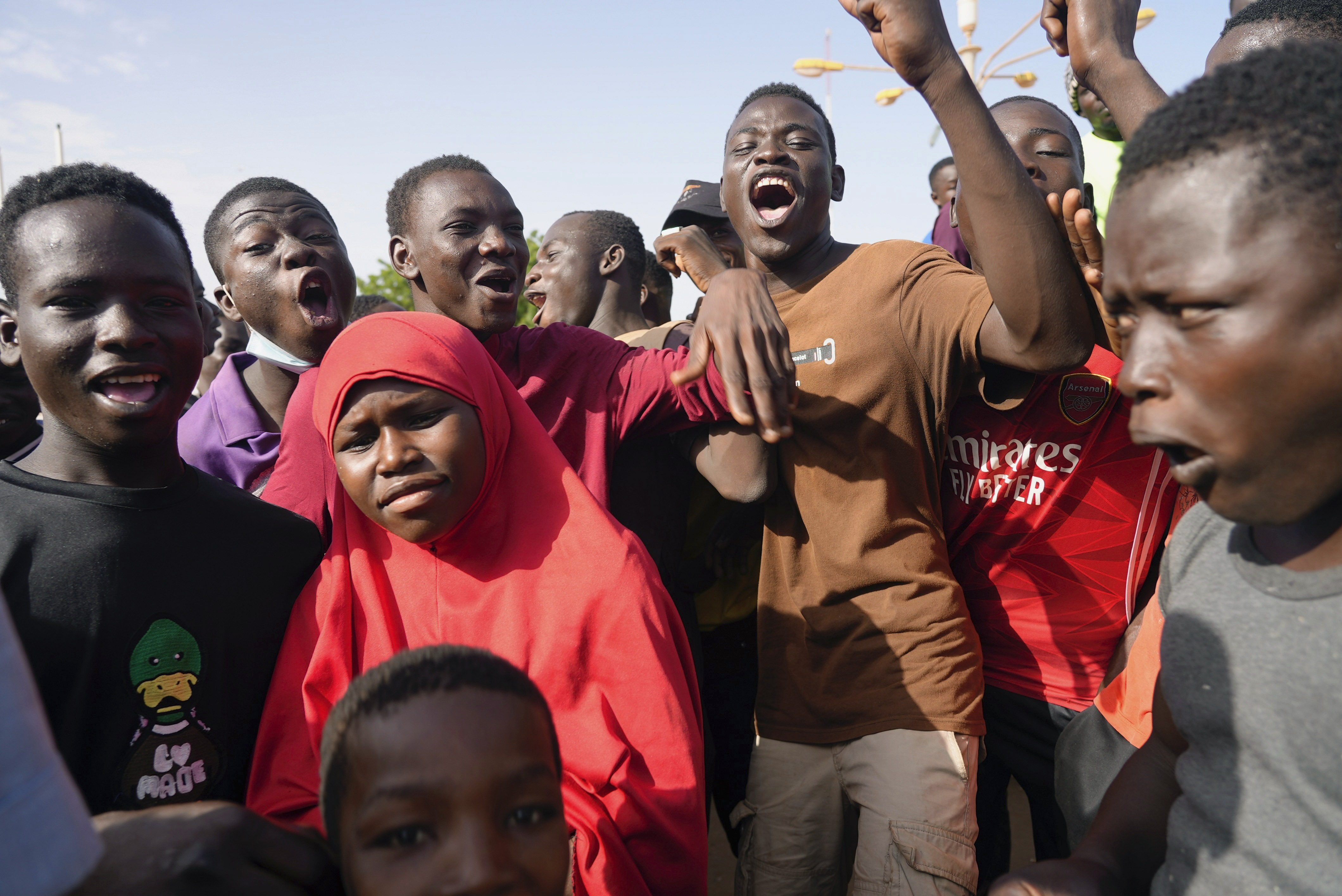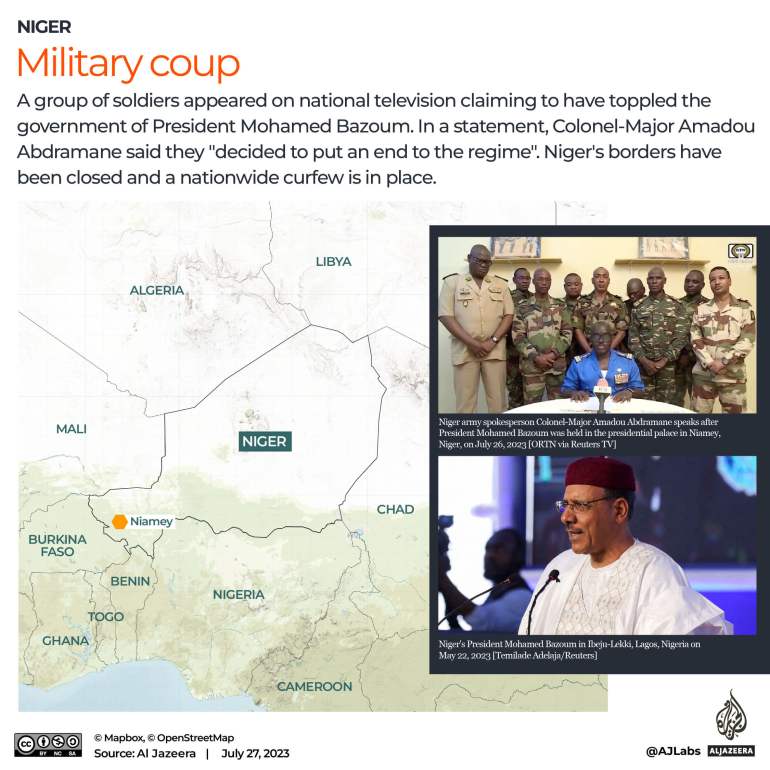
A delegation from West Africa’s regional bloc ECOWAS has met Niger’s ousted president Mohamed Bazoum and held talks with military government leader General Abdourahmane Tchiani.
A plane carrying the delegation landed in the capital Niamey at about 1pm (12:00 GMT) on Saturday, a day after the bloc’s military chiefs said they were ready to intervene militarily to reinstate Bazoum.
Niger’s governing military council confirmed the arrival of the ECOWAS representatives, headed by former Nigerian leader Abdulsalami Abubakar.
The group was allowed to meet Bazoum, the first time foreign officials have seen the ousted leader in weeks.
“We met Bazoum, we heard from him what was done to him. He told us about the problems he’s facing. We’ll take it to the leaders who sent us here,” said Abubakar. “Without doubt, the meeting has opened discussions to lead to a way to resolve this crisis.”
A previous ECOWAS delegation led by Abubakar earlier this month tried and failed to meet Bazoum and the coup leader.
The West Africa representatives also met with Tchiani on Saturday, though there was no information as to what was discussed.
There was no immediate comment from the military rulers. Tchiani was scheduled to address the nation in a televised address on Saturday evening.
‘Liberation of the president’
ECOWAS delegates came to Niamey and joined efforts by United Nations Special Representative for West Africa and the Sahel, Leonardo Santos Simao, who arrived on Friday, in trying to facilitate a resolution to the continuing crisis.
On Friday, UN spokesman Stephane Dujarric said Simao would meet the military rulers and other parties to try and facilitate a swift and peaceful resolution to Niger’s crisis.
“What we want to see is a return to the constitutional order. We want to see the liberation of the president and his family, and restoration of his legitimate authority,” Dujarric said.
On August 10, ECOWAS ordered the deployment of a “standby force” to restore constitutional rule in the country.
The soldiers who overthrew democratically elected Bazoum in July have quickly entrenched themselves in power, rebuffed most dialogue efforts, and kept Bazoum, his wife and son under house arrest in the capital.
‘Putschists won’t be holding their breath’
On Friday, the ECOWAS commissioner for peace and security, Abdel-Fatau Musah, said 11 of its 15 member states agreed to commit troops to a military deployment, saying they were “ready to go” whenever the order was given.
“The D-day is also decided,” he added.
The 11 member states do not include Niger itself and the bloc’s three other countries under military rule following coups: Guinea, Mali and Burkina Faso. The latter two have warned they would consider any intervention in Niger an act of war.
On Friday, Niger’s state television said Mali and Burkina Faso dispatched warplanes in a show of solidarity.
Friday’s announcement is the latest in a series of empty threats by ECOWAS to forcefully restore democratic rule in Niger, conflict analysts said.
Immediately after the coup, the bloc gave the military government seven days to release and restore Bazoum, a deadline that came and went with no action.
“The putschists won’t be holding their breath this time over the renewed threat of military action,” said Ulf Laessing, head of the Sahel programme at the Konrad Adenauer Foundation, a think tank.
Mutinous soldiers are cementing their rule and appointing loyal commanders to key units while ECOWAS has no experience with military action in hostile territory and would have no local support if it tried to intervene, he said.
“Niger is a very fragile country that can easily turn, in case of a military intervention, into a failed state like Sudan,” said Laessing.
ECOWAS used force to restore order in member countries in 2017 in The Gambia when longtime President Yahya Jammeh refused to step down after he lost the presidential election. But even in that case, the move had involved diplomatic efforts led by the then-presidents of Mauritania and Guinea, while Jammeh appeared to be acting on his own after the Gambian army pledged allegiance to the winner of the election, Adama Barrow.
‘We will all go’
On the streets of the capital on Saturday, many residents said they’re preparing to fight back against an ECOWAS military intervention.
Thousands of people in Niamey lined up outside the main stadium to register as volunteers or fighters, and to help with other needs in case the military government requires support. Some parents brought their children to sign up; others said they’d been waiting since 3am while groups of youths boisterously chanted in favour of the military leaders and against ECOWAS and the country’s former colonial ruler France.
″I am here for the recruitment to become a good soldier. We are all here for that,” said Ismail Hassan a resident waiting in line to register. “If God wills, we will all go.”
The humanitarian situation in the country is also on the agenda. Before the coup, nearly three million people were facing severe food insecurity and hundreds of thousands were internally displaced, according to CARE, an international aid group.
Economic and travel sanctions imposed by ECOWAS after the coup, coupled with the deteriorating security, will have dire consequences for the population, CARE said.
Previously, Western countries saw Niger as one of the last democratic nations they could partner with to beat back growing attacks linked to al-Qaeda and the ISIL (ISIS) armed group, and poured millions of dollars of military aid and assistance into shoring up Niger’s forces.
Since the coup, fighters have been taking advantage of the freedom of movement caused by suspended military operations by the French and Americans and a distracted Nigerien army focusing efforts on the capital.
Last week, at least 17 soldiers were killed and 20 wounded during an ambush. It was the first major attack against Niger’s army in six months. A day later, at least 50 civilians were killed in the Tillaberi region by suspected ISIL fighters.
“The recent attacks should motivate all parties to work for as speedy and inclusive a transition as possible so they can get back to the crucial business of protecting civilians from the devastating consequences of war,” said Corinne Dufka a political analyst who specialises in the Sahel region.
“In due time, Nigeriens and their partners should look long and hard at why and how democracy in Niger faltered.”







